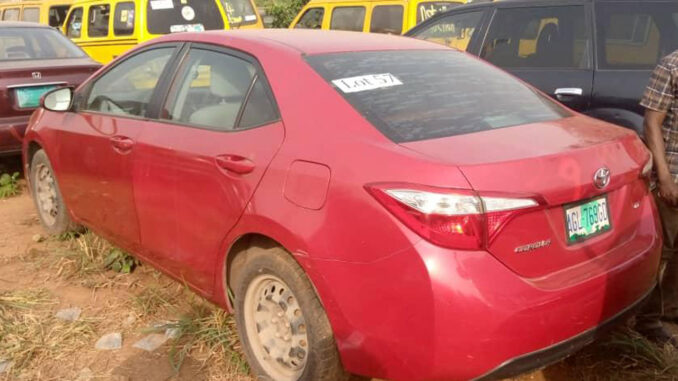
Impending review of the premium currently paid on vehicle insurance in Nigeria appears necessary after some 18 years gap. But an upward adjustment solely for an increase in revenue puts the cart before the horse.
While the proposed 50 per cent jack up in third-party premium aims to bring the operators more income and cushion inflation rate effects, it again overlooks a mammoth of uninsured vehicles – the main reason operators are poor and the insurance undertaking ineffective. For equity purposes, better energy should be dissipated at bringing violators into the net than overburdening law-abiding citizens with adjusted rates.
The staggering statistics from the vehicle insurance end of the economy signposts a dismal trend in the country generally. For all the good policies that the government has in place, mediocre enforcement is often the let-down. The familiar trend, again, showed the yawning gap between policymakers and agencies of government that are saddled with enforcement, creating a leeway for sabotage.
When the National Insurance Commission (NAICOM) approved the N5000 minimum threshold for vehicle insurance in 2004, it had in mind a well-reimbursed functional scheme that leaves no complaints about the operators. The third-party minimum rate was a 400 per cent spike in N1000 erstwhile paid and left the vehicle owners largely unhappy. The operators are supposed to be the happier of the divide, but 18 years down the line, with inflation pushing up the cost of repairs astronomically, the operators are already walking the tight ropes of review and another upward adjustment in rates.
However, findings showed a fiercer barrier than galloping inflation. Of the 12 million registered vehicles plying Nigerian roads today, verifiable records of the insurance companies showed that only 2.53 million have genuine motor insurance as of April 2021, leaving about 9.5 million uninsured. Industry operators noted that the majority of the 9.5 million vehicles that are not insured use fake motor insurance papers, while others do not have certificates at all, even though the Federal Roads Safety Corps Act requires that every automobile on the road must have, at least, a third-party motor insurance policy.
Less than 20 per cent coverage of a supposed general scheme is the elephant in the room that deserves better attention for all parties. It implies an average of one-fifth of the sum accruable to the vehicle insurance scheme, being a massive revenue loss to both operators and government coffers yearly. But only the government and the insurance operators should have themselves to blame. Indeed, the Federal Government that also controls law enforcement agencies has rarely complained about the routine losses. The operators too have the limited moral ground to raise the alarm because liability claims on popular third-party insurance policy coverage are far in-between among Nigerians that are not yet aware of their rights under the policy. For the very few that lay claims, underwriters do make the process frustratingly tedious for policyholders, with obnoxious undercutting as if to absolve the insurer of liabilities. Such rarely instil confidence in the scheme and in that case, the motive of the insurance scheme is largely defeated.
Indeed, the scheme has to restore equity for a start. The proper place to start is public enlightenment on the importance of insurance policy and better commitment to honour obligations to policyholders. The right campaign should drum up the importance of insuring properties, being a modern global standard that should not exclude Nigerians. The rationale is to safeguard irrecoverable losses, either to self or others, through a crowd-funding method that involves all. Generally, a car is a precious sophisticated machine with enormous risk. Besides the dangers of theft, burglary and road accidents, it could endanger other third parties i.e. human beings or properties. Given the dense population in Nigeria, road crashes are all too common with a wide compensation margin on the trail. And that is where third-party insurance, at the least, comes into the picture globally to protect policyholders’ finances and offer restitution to the affected third party in the case of an accident. It is for that reason that the Nigerian law made it mandatory that no person should be allowed to drive a motor vehicle in a public area without a valid third-party insurance policy.
The third-party policy globally covers the death of a third party in an accident, or any kind of injury, partial or full disability and damages caused to the third party in the accident. Therefore, the insurance operators should live up to these obligations in Nigeria to bolster public confidence. Certainly, not all policyholders will incur liabilities in a year, but for the few that do, there should be proper value for the contract, to serve as an avenue to freely draw more vehicle owners into the insurance net.
The subtle moral approach poses more of a potent tool to improve the efficiency of the scheme than the narrative on galloping inflation in a pandemic age and 50 per cent upward adjustment currently present. Though the insurance operators have begun moves to upgrade premiums, the loose warnings of stakeholders that it will further populate the group of uninsured and fake certificate holders, should not be ignored. They have said that with the penetration level of 0.4 per cent to the Gross Domestic Product (GDP), there is a need for the industry to build public trust by promptly paying claims to policyholders when the need arises.
Above all, it will not be in the interest of collective well-being to inflate the premium threshold that is paid on vehicle insurance at this time. Otherwise, the vehicle insurance community shall be arm-twisting beleaguered consumers to make up for their losses, apparently forgetting that the economic realities are peculiar to all. There is a need for better imagination at problem-solving than passing the buck to poor Nigerians. To upgrade the vehicle insurance rate without first building awareness and public trust will not rake in more revenue. It will further discourage patronage and defeat the entire plan.
END

Be the first to comment